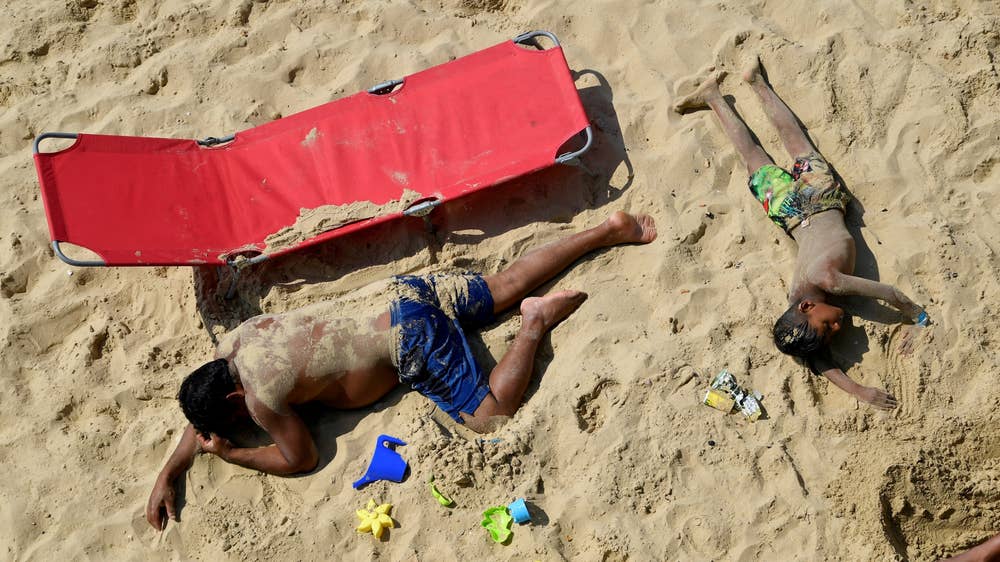What is the true story behind Nigel Farage's claim that 'illegal' immigrants are staying in hotels?
On an overcast day in late July Nigel Farage, the eurosceptic, anti-immigration leader of the Brexit party, tried and failed to stay at a hotel in Worcestershire.
“I tried to book a room at the 4 Star Bromsgrove Hotel & Spa, but it was closed to the public”, he wrote on Twitter.
“Turns out it’s accommodating 147 illegal migrants and we’re all paying for it.”
In an accompanying 10 minute video Mr Farage could be seen travelling to the site on the alleged urging of local residents, while making a number of claims about the state of immigration in the UK.
But does his central allegation – that the UK taxpayer is footing a multi-billion pound bill to put up “illegal migrants” in four star hotels – hold up to scrutiny?
Are the residents of the hotel illegal immigrants?
While many of the claims Mr Farage makes in his video are a difficult blend of muddled figures and statistics used to defend his points of view, his assertion that the hotel is populated by illegal immigrants appears to be among the easiest to debunk.
The Britannia-owned Bromsgrove Hotel and Spa is, like a number of hotels across the country, being used to temporarily house asylum seekers – according to the government and the site’s operators, Serco.
Unlike irregular migrants who may be in breach of the law, asylum seekers are those attempting to legitimately and legally make a claim to sanctuary in the UK – for example to escape persecution.
Temporary accommodation has long been an element of the asylum application process, and makes up part of the UK’s international obligations to protect those seeking sanctuary.
As those applying for asylum are unable to work while they are processed by the Home Office they are housed by the taxpayer until the claim is either approved or rejected.
Who is there?
No hype, just the advice and analysis you need
In the video, Mr Farage repeatedly says the hotel is housing “147 young men”, at one point adding they are “mostly in between the ages of 18 and 26”.
However, it is unclear how he would have reached this figure – with Serco staff later confronted by the politician saying they are unable to disclose information on those staying at the site.
While there is no publicly available detail on how many people are currently residing in the building, the hotel had 148 rooms when it was open to the public.
After being turned away from the hotel, he said: “As you saw I walked into the hotel there, was not welcome, it’s closed, but of course it’s not closed because all 147 beds are taken” – making it possible the figure was in fact the number of rooms Mr Farage had been unable to book on their website.
The identification of the ages and genders of those staying at the hotel was also a claim made without reference to a source.
While men typically make up the majority of asylum seekers in the UK – with 67 per cent of all asylum seekers male between 2010 and 2018 – it is unclear where the assertion the residents are men aged between 18 and 26 came from.

Is the UK housing 48,000 asylum seekers in such settings at a cost of £4bn?
“What I have discovered is it’s not just you suffering like this,” Mr Farage tells a Bromsgrove couple in their home during the video. “We are now housing 48,000 people like this at a cost, an estimated cost, over the next ten years of £4bn.”
“It is just unbelievable”, the woman who invited Mr Farage into her home replies.
However, Mr Farage’s assertion does not appear to provide necessary context to the 48,000 figure – which is based on the National Audit Office’s (NAO) assessment of an outsourcing deal agreed in 2019.
While around 48,000 asylum were being accommodated by the UK’s asylum system as of March 2020, the population of those housed in hotels actually averages out at a figure closer to 1,000, according to the NAO.
Hotels serve as part of the provision of temporary accommodation provided to UK asylum seekers – a population that tends to average out at 2,800 people including both those staying in hospitality and short term housing.
Between September 2019 and February 2020, the length of time people stayed in such premises averaged out at 26 days, at which point they were moved to long term accommodation for the duration of their asylum application.
And while the estimated cost of outsourced asylum contracts comes to a value of £4bn over the next ten years – at £400m per year the figure makes up roughly 3.7 per cent of the Home Office’s current annual budget.
The provision of housing, as well as healthcare and either free meals or £35.39 a week on a prepaid card for food, clothing and toiletries, makes up part of the nation’s obligation to ensure those seeking asylum are given proper care while their applications are processed.
tinyurlis.gdclck.ruulvis.netshrtco.de
